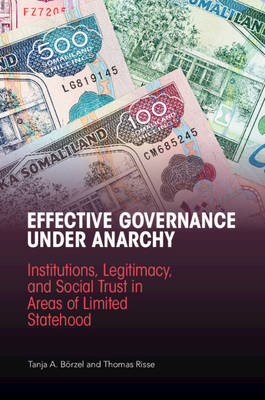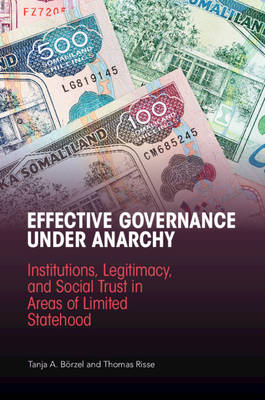
Bedankt voor het vertrouwen het afgelopen jaar! Om jou te bedanken bieden we GRATIS verzending (in België) aan op alles gedurende de hele maand januari.
- Afhalen na 1 uur in een winkel met voorraad
- In januari gratis thuislevering in België
- Ruim aanbod met 7 miljoen producten
Bedankt voor het vertrouwen het afgelopen jaar! Om jou te bedanken bieden we GRATIS verzending (in België) aan op alles gedurende de hele maand januari.
- Afhalen na 1 uur in een winkel met voorraad
- In januari gratis thuislevering in België
- Ruim aanbod met 7 miljoen producten
Zoeken
Effective Governance Under Anarchy
Institutions, Legitimacy, and Social Trust in Areas of Limited Statehood
Tanja A Börzel, Thomas Risse
Paperback | Engels
€ 59,45
+ 118 punten
Uitvoering
Omschrijving
Policy makers and academics alike have mistakenly promoted an agenda which takes well-governed democratic and consolidated 'Weberian' states as the model for the world and the goal of development programs. Whilst Western industrial democracies are the exception, areas of limited statehood where state institutions are weak and ineffective, are everywhere, and, this books argues, can still be well-governed. Three factors explain effective governance in areas of limited statehood: Fair and transparent institutions 'fit for purpose, ' legitimate governors accepted by the people, and social trust among the citizens. Effective and legitimate governance in the absence of a functioning state is not only provided by international organizations, foreign aid agencies, and non-governmental organizations but also by multi-national companies, rebel groups and other violent non-state actors, 'traditional' as well as religious leaders, and community-based organizations. Börzel and Risse base their argument on empirical findings from over a decade of research covering Latin America, the Middle East, Sub-Saharan Africa, and Asia.
Specificaties
Betrokkenen
- Auteur(s):
- Uitgeverij:
Inhoud
- Aantal bladzijden:
- 380
- Taal:
- Engels
Eigenschappen
- Productcode (EAN):
- 9781316635049
- Verschijningsdatum:
- 8/04/2021
- Uitvoering:
- Paperback
- Formaat:
- Trade paperback (VS)
- Afmetingen:
- 196 mm x 229 mm
- Gewicht:
- 544 g

Alleen bij Standaard Boekhandel
+ 118 punten op je klantenkaart van Standaard Boekhandel
Beoordelingen
We publiceren alleen reviews die voldoen aan de voorwaarden voor reviews. Bekijk onze voorwaarden voor reviews.









